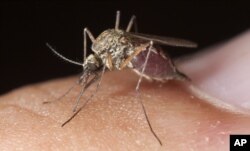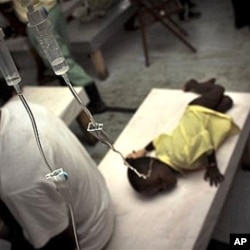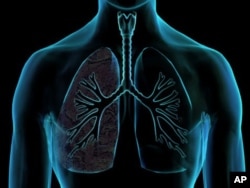This is Part 4 of a 5-part series: Climate Change
Continue to Parts: 1 / 2 / 3 / 4 / 5
When an internationally renowned science journalist and biologist began examining links between climate change and declining human health four years ago, he had no idea what he would discover.
But Dan Ferber, who writes for Science, one of the world’s leading scientific journals, was shocked at the “dramatic scope” of the health epidemics that higher temperatures are set to cause, especially in developing countries.
“Before I began investigating climate change, I never would have thought about the connections between global warming and outbreaks of infectious diseases…. Not for a minute would I have connected the drying of forests to surges in respiratory illnesses,” said Ferber.
Scientists say the planet’s becoming warmer mainly because of harmful emissions, such as carbon, from the world’s factories and power stations. They say the higher temperatures are causing more extreme weather events, such as droughts and floods, which in turn are resulting in severe health crises.
Ferber recently wrote a book, Changing Planet, Changing Health, with one of the world’s top tropical health specialists, Dr. Paul Epstein.
Epstein is also associate director of the Center for Health and the Global Environment at Harvard Medical School. He’s working with the Intergovernmental Panel on Climate Change, a collection of scientists mandated by the United Nations, to assess the health impacts of changing weather patterns.
Researching their book, Ferber and Epstein traveled the world, uncovering previously unknown ties between climate change and such life-threatening illnesses as malaria and cholera.
“Small changes of just a couple of degrees Celsius can be enough to change the range of infectious diseases,” said Ferber. “The threats are quite dramatic and nobody’s paying enough attention to this.”
Climatologists have estimated that temperatures in large parts of Africa will increase by four degrees C by 2100 – and possibly much sooner.
Malaria to be widespread
Ferber warned that Africa should begin preparing for significant rises in insect-borne diseases, especially malaria. He said warmer temperatures will allow mosquitoes that carry malaria to live and breed in areas that were previously too cool for them.
This is already happening in some parts of Africa, said Kevin Chika Urama, a Kenyan ecological economist who’s analyzing the effects of climate change on Africa.
He explained that people had originally moved to the highlands of East Africa, in countries like Kenya and Ethiopia, to escape from mosquitoes infected with malaria. But, with temperatures rising, Urama said the disease is now prevalent in the higher areas that were previously malaria-free.
Ferber’s visits to East Africa confirm this analysis. “In the central Kenya highlands there is now malaria in areas where there didn’t used to be malaria because it is warmer, which gives an advantage to the mosquitoes which can (now) live in areas that used to be too cold for them. And the malaria parasite can live inside the mosquitoes and reproduce faster (because of the warmer weather).”
According to the World Malaria Report 2010, there were 225 million cases of malaria and almost 800,000 fatalities from the disease in 2009. Most of those who died were children in Africa.
The World Health Organization estimated that a child dies from malaria on the continent every 45 seconds. The disease accounts for about 20 percent of all childhood deaths in Africa.
If Africa continues to warm, said Urama, these statistics will be far worse in the near future.
Warmer sea = more cholera
Health experts said the higher intensity and longer droughts that are expected to sweep Africa because of climate change will boost levels of water borne diseases, such as cholera. Droughts cause an absence of fresh, clean water for drinking and washing, and cholera thrives in such dirty, unhygienic conditions.
Cholera is an infection of the small intestine caused by a bacterium. Its symptoms are profuse diarrhea and vomiting, which in turn result in dehydration and, if not treated, is sometimes fatal. Cholera is contracted primarily through drinking water or eating food contaminated by feces from an infected person.
Epstein has worked as a doctor across Africa, including in Mozambique. In the late 1970s, he found himself in the midst of a cholera epidemic at Barra on the country’s north coast. “That was the first cholera epidemic in that area in the memory of the medical profession,” said Ferber. “At the time, no one knew where this cholera was coming from and why it was such a serious outbreak.”
More than a decade later, American microbiologist Rita Colwell made groundbreaking findings about the causes of cholera epidemics. Her work led to Epstein establishing a connection between cholera and climate change.
Colwell discovered that the cholera bacterium “hid out” in the ocean. There it piggybacks on tiny animals called zooplankton that eat tinier plants called phytoplankton.
Ferber explained, “What Dr. Colwell found was that in the event of ocean waters warming, it would cause blooms of phytoplankton and the zooplankton would thus also bloom. Storms would carry the zooplankton into inland waters, carrying the cholera bacteria, and (that) would initiate cholera epidemics.”
Scientists say higher global temperatures are warming the oceans. Epstein has concluded that the warmer the oceans, the greater the possibility of cholera epidemics, and the higher their intensity, in the near future.
Asthma and smoke from fires
Ferber said elevated greenhouse gas levels and hotter weather are causing more people worldwide to suffer from respiratory diseases, especially asthma.
He explained, “Allergies trigger asthma. And allergies get worse as the temperature rises. Pollution triggers asthma – and the hotter the weather, the worse the pollution…”
All over the world, said Ferber, hotter weather and less rain are killing forests. This, he emphasized, has serious implications for people’s health. “If you turn forests into tinder, you get large increases in forest fires and large increases in smoke in the atmosphere. Smoke…causes increased risk of heart attack and increased respiratory problems.…”
Health authorities in Russia estimated that almost 60,000 people died as a result of the violent heat wave that struck the country last year. They said a large proportion of this toll died from respiratory stress as a result of inhaling smoke from the many forest fires that erupted during the intense heat.
End the ‘gambling’
As a first step to a healthier world, Ferber and Epstein want to see the creation of a new global treaty that commits all countries to drastically reducing greenhouse gas emissions and to embracing renewable, clean energies.
If this doesn’t happen soon, said Ferber, the world will continue gambling with its survival, and it will be filled with much more disease and death than it currently is.
“We have solutions available that can both help the global economy and help mitigate climate change and adapt to what’s coming,” he said, adding, “The good news is that by moving towards renewable energy solutions we’ll create the basis of a 21st century economy. Simultaneously we’ll create the basis of wellness for people throughout the world and preserve the world’s natural resources, without which we will all perish eventually.”






